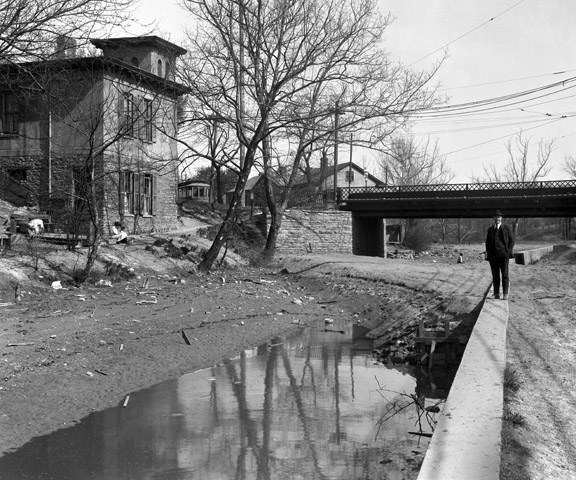In May of 2013, we received a UC Faculty Development Council Grant to run a series of five workshops in order to help us determine the best ways to use The Elliston Digital Audio Archive for instruction and research. The second of these lectures will take place on October 5, 2013 and will be led by Kenneth Sherwood. This workshop will develop our understanding of how this digital audio archive can function in the literature classroom and the poetry workshop.
ARB Makes the "History" Pages of Cincinnati Magazine!
By: Kevin Grace
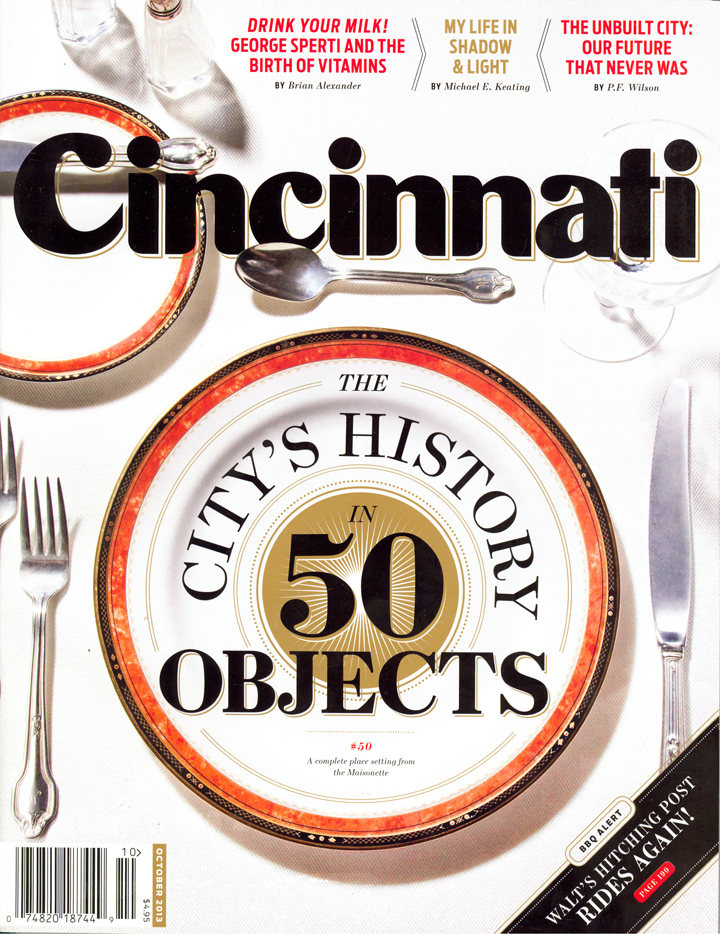 In the October issue that just hit the newsstands, Cincinnati Magazine has an illustrated article called “The City’s History in 50 Objects.” The magazine’s editors, writers, and fact-checkers began this endeavor several months ago, calling upon libraries and archives, museums and individuals, to submit ideas for items that help tell the story of the city’s heritage.
In the October issue that just hit the newsstands, Cincinnati Magazine has an illustrated article called “The City’s History in 50 Objects.” The magazine’s editors, writers, and fact-checkers began this endeavor several months ago, calling upon libraries and archives, museums and individuals, to submit ideas for items that help tell the story of the city’s heritage.
Of the dozens of suggestions they received, the editors decided upon one of the items in the holdings of the Archives & Rare Books Library: our freshman beanie from the turn of the 20th century. The provenance of our beanie is unknown; it’s just one of those things that eventually end up in the University Archives, but brings an interesting bit of history (rather like our life-size cutout of former UC president Nancy Zimpher that now stands guard in our Rare Books Room!). Continue reading
Travel the World with UC Libraries! Destination for Today: Bolivia
 Featured country: Bolivia.
Featured country: Bolivia.
Red on the Bolivian flag symbolizes valor (e.g., the blood of patriots spilled in battle); green, hope and the fertility of the land; and the yellow band in the center represents the country’s vast mineral resources.
Point of interest: Tiwanaku (Tiahuanaco/Tiahuanacu).
This pre-Columbian archaeological site in la Paz is a UNESCO World Heritage
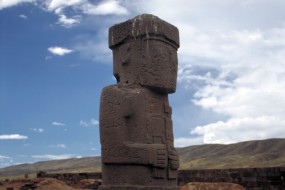
Sacred Statue in Tiwanaku – Bolivia
Site. Tiwanaku is believed to have obtained its name from an Aymara term, taypikala (“Stone in the Center”). Founded around 200 BC, this ancient city is considered an important predecessor to the Inca Empire. Tiwanaku has outstanding stone carvings and ancient buildings that exemplify the Andean pre-Hispanic civilization.
Source: Global Road Warrior.
Featured library resource: Collins world atlas : clear, detailed, and up-to-date mapping, latest stunning satellite images, UNESCO world heritage sites. London : HarperCollins, 2010.
Langsam Reference Oversize G1021 .H59846 2010
Posted by Olga Hart
Central Parkway and The Making of a "Grand Boulevard" = Adventures in the Subway and Street Improvements Digitization Project
By Angela Vanderbilt
The primary task of the Rapid Transit Commission and the 1917 Bauer Bill (Senate Bill 264, which authorized the formation of a commission for the design and construction of a rapid transit system) was not the construction of the subway alone, but the construction of Central Parkway, the “grand boulevard” that was to replace the Miami & Erie Canal. The Commission was also tasked with the secondary subway project to ensure that the Parkway was built, since the one could not commence before the other was underway, a means of ensuring the success of both.
When it was first proposed in a 1907 report, written by landscape architect George Kessler regarding the development of a city park system for Cincinnati, Central Parkway was meant to rival Boston’s Commonwealth Avenue and the grand boulevards of Europe, to be landscaped and lined by stately brownstones and mansions. Accented by decorative lampposts, fountains, trees and shrubbery, the new boulevard was to provide a park-like atmosphere for Cincinnatians, with sidewalks to stroll and benches on which to relax and enjoy the scenery of the Parkway as it wound its way north from Walnut Street in the downtown business district to Lundlow Avenue in the residential neighborhood of Clifton.
Travel the World with UC Libraries! Destination for Today: Belgium
 Featured country: Belgium
Featured country: Belgium
Did you know the term “duffel bag” derives from the Belgian town of Duffel, where the thickly woven bags were first manufactured? Or that Belgian beer and chocolate are world-renowned? Approximately the size of the state of Maryland, the Kingdom of Belgium is located in western Europe, surrounded on three sides by The Netherlands to the north, Germany to the east, and France to the south. Because of its strategic location, Belgium is one of the cultural centers of Europe, and the capital of Brussels is the seat of many European Union offices. Flemish, French, and German are the official languages of Belgium, however many people speak English, as well as Spanish, Arabic, and Dutch because historically the country has been a crossroads for immigrants. Belgium was devastated by the World Wars of the 20tch century, but most of its centuries-old castles and public buildings have survived, and today its vibrant culture make Belgium a nation of fashion, international commerce, and tourism in such beautiful cities as Bruges and Antwerp.
Source: CultureGrams.
Featured library resource: Foreign Information by Country.
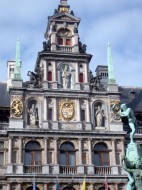
On one of Antwerp’s city squares.
By Kevin Grace
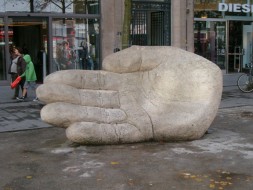
No, this street sculpture in Antwerp isn’t a tribute to UC’s Greg Hand.
Travel the World with UC Libraries! Destination for Today: Belarus

Featured country: Belarus.
The Republic of Belarus is situated in north-eastern Europe. The official languages are Belarusian and Russian.
Interesting fact about Belarus: The Belavezha forest reserve is home to the zubry (European bison), which became extinct elsewhere in Europe long ago.
Source: CultureGrams
Featured library resource: Ethnologue: Languages of the World
Posted by Olga Hart
Travel the World with UC Libraries! Destination for Today: Bangladesh
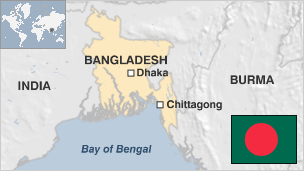 Featured country: Bangladesh.
Featured country: Bangladesh.
Fact: Formerly East Pakistan, Bangladesh came into being only in 1971, when the two
parts of Pakistan split after a bitter war which drew in neighboring India.
Source of the country information and image: BBC News Profile – Bangladesh.
Featured resource: Foreign Information By Country (prepared by the University of Colorado Government Documents Department).
Posted by Olga Hart
Elliston Poetry Reading, September 27, 2013, Joseph Campana
The next reading in the Elliston Poetry Room will be by poet Joseph Campana.
September 27, 2013, 4:00 PM, Elliston Poetry Room, 646 Langsam Library
Joseph Campana is the author of two collections of poetry, The Book of Faces (Graywolf, 2005) and Natural Selections (2012), which received the Iowa Poetry Prize. His poems appear in Slate, Kenyon Review, Poetry, Conjunctions, Colorado Review, and many other venues.
The author will also give a lecture entitled “The Child’s Two Bodies: Shakespeare and the Ends of Succession in Macbeth” on September 26th at 4:00 PM in McMicken Hall Room 43.
Look for recordings of this presentation soon in the digital collection, The Elliston Project: Poetry Readings and Lectures at the University of Cincinnati.
Learn more about Events sponsored by the Elliston Poetry Fund.
The Elliston Project Digital Archive Theory Workshop, September 21, 2013
In May of 2013, we received a UC Faculty Development Council Grant to run a series of five workshops in order to help us determine the best ways to use The Elliston Digital Audio Archive for instruction and research. The first of these lectures will take place on September 21, 2013 and will be led by Jerome McGann. This workshop will map the conceptual significance and possibilities of The Elliston Project and of digital audio archives more generally.
Elliston Project Digital Archive Workshops
The audio archive of the Elliston Poetry Room is an astonishing set of recordings going back to the mid-1950s, housing recordings of visiting poets, especially those brought to UC as Elliston Poets in Residence. As all of these recordings were in the now relatively inaccessible format of audio cassettes, the English Department, partnering with the UC Libraries, began a digitization effort, ultimately creating an online archive of poetry readings and lectures.
In May of 2013, we received a UC Faculty Development Council Grant to run a series of five workshops in order to help us determine the best ways to use this digital audio archive for instruction and research.

